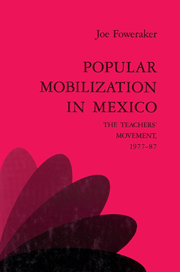Book contents
- Frontmatter
- Contents
- Preface
- Glossary of acronyms
- Introduction: The character and context of popular mobilization in contemporary Mexico
- PART I POPULAR MOVEMENT AND SYNDICAL STRUGGLE
- PART II INSIDE THE MOVEMENT IN CHIAPAS
- PART III NATIONAL MOBILIZATION AND SYSTEM RESPONSES
- PART IV POPULAR MOVEMENTS AND POLITICAL CHANGE
- 10 Institutional linkage
- 11 The political system
- 12 The political meaning of popular movements
- Bibliography
- Index
10 - Institutional linkage
Published online by Cambridge University Press: 29 September 2009
- Frontmatter
- Contents
- Preface
- Glossary of acronyms
- Introduction: The character and context of popular mobilization in contemporary Mexico
- PART I POPULAR MOVEMENT AND SYNDICAL STRUGGLE
- PART II INSIDE THE MOVEMENT IN CHIAPAS
- PART III NATIONAL MOBILIZATION AND SYSTEM RESPONSES
- PART IV POPULAR MOVEMENTS AND POLITICAL CHANGE
- 10 Institutional linkage
- 11 The political system
- 12 The political meaning of popular movements
- Bibliography
- Index
Summary
Linkage: autonomy and representation
In discussing the linkages between the teachers' movement and the Mexican political system, this analysis has tended to emphasize the ways in which the system has shaped the trajectory of the movement, rather than exploring the influence of the movement on processes of institutional change. In the preceding chapter some attempt was made to correct this bias, but, in general, the influence of popular organization on political change in Mexico has been difficult to discern, and the literature has only recently begun to address the issue (Foweraker and Craig 1990). Research and writing has usually focused on the two poles of the relationship between popular struggle and the political system, with scant attention to the relationship itself. This is partly a result of the conceptual problems posed by popular movements, which aspire simultaneously to more autonomy and more representation. But the lessons of the teachers' movement suggest that this contradiction in terms is more apparent than real and that its resolution may reveal the political content of popular “linkage politics.”
There is no doubt that popular movements are reluctant to form alliances with political parties (see Chapter 9), just as they are wary of cooptation by the State. But a lateral autonomy separating popular movements from political parties is different from a vertical autonomy separating them from the State, and while the former has been the general rule, the latter has not. Yet it has been argued that anything less than a complete autonomy from the State leads to a “constant destruction of democratic channels and spaces” (Zermeño 1987a), which means that the only movements to survive will be those “with restricted identity.”
- Type
- Chapter
- Information
- Popular Mobilization in MexicoThe Teachers' Movement 1977–87, pp. 145 - 156Publisher: Cambridge University PressPrint publication year: 1993

